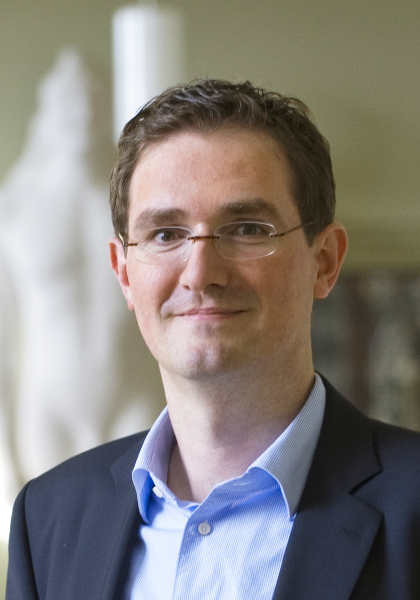“Europeans must have confidence in the future”

Mathias Hoffmann, Tobias Straumann, the signs for Europe aren’t good at the moment. Europe’s economic powerhouse, Germany, is faltering. The EU has missed opportunities to get ahead in future technologies like AI and electric mobility, and there’s a trade war with the US. In your view, is Europe at risk of losing its position as a global economic power?
Mathias Hoffmann: If Europe focuses on its strengths and makes adjustments in key areas, it can preserve its global standing. What’s the alternative to Europe, after all? The Chinese economic and social model is unsustainable over the long term and is increasingly coming under pressure. Growth driven exclusively by exports is reaching its limits, and long-term stagnation is becoming increasingly apparent. The trade war launched by Trump will severely undermine global investors' confidence in the US economy, which was booming until recently, and in the country's political institutions for the foreseeable future. Europe still has a relatively good societal model. Our economic performance may not be great, but it’s a basis to build on. I’m not that pessimistic.
Tobias Straumann: I share this perspective. It’s not true that Europe has missed the boat on AI or electromobility. But what we are missing is new companies being founded in these fields. In Europe, innovations come out of research institutions like the Max Planck centers in Germany. But since the European common market hasn’t been optimally developed, it’s more difficult to scale ideas. That’s why people emigrate to the US, where it’s easier to get financing for turning innovations into products. However, it’s not easy to change internal market conditions in Europe so that these things work really well.
Mathias Hoffmann: I’m also of the opinion that Europe needs to make better use of the enormous potential of its internal market. However, a lot of the groundwork simply hasn’t been laid here. Whether it's vocational training, tax legislation, migration opportunities for workers, integration into social security systems, or regulations that differ in each country, so much is still patchwork. A unified market with 500 million relatively affluent customers would be a game-changer, especially for startups or large industries that have high capital costs for developing new technologies.

Europe needs to make better use of the enormous potential of its internal market. However, a lot of the groundwork simply hasn’t been laid here.
So what exactly does improving conditions for the internal market mean in concrete terms?
Mathias Hoffmann: A great deal of innovation occurs in relatively technology-intensive medium-sized companies. They’re not in the spotlight, but they are the real backbone of the economy. Europe needs to offer these SMEs a future. In my opinion, a capital market and banking union is very important here. Cross-border mergers of banks are needed, especially those that serve small and medium-sized enterprises. A medium-sized company in the Swabian Jura cannot choose between twenty banks to get a loan. It has one local bank it can go to, and that bank dictates the terms. Whether this bank then understands what the company does and what its European expansion plans are is questionable. A banking union would offer a significantly better foundation.
But right now, you get the impression that it’s mostly national forces resisting unity that are getting stronger. Is it realistic to expect Europe to get its act together and tackle these tasks?
Tobias Straumann: I think that having a uniform European internal market is a utopian idea. Standardizing tax systems, social insurance and vocational training is difficult. But maybe we don’t need to do that to remove the barriers to innovation. Europe should focus on strategically important issues, like the standardization in the financial sector that we talked about earlier. In addition, certain areas could be liberalized without significant resistance. Startups, for example, could gain privileged access to all markets. Or you could reduce hurdles for certain future-oriented industries like communication and digital technology. If Europe intelligently focuses on essential areas, then I consider it entirely possible that progress will be made in the next five years.
Mathias Hoffmann: Implementing the capital market and banking union is not easy, but it’s feasible in my opinion. This would be a decisive signal and would make Europe much stronger internally. With tax systems, there are at least a few signals that can be sent, but I don't see any sign that states will be converging anytime in the next few years regarding their social security systems. It's too complicated and there's really no political will.

Europe's great strength has always been that it has permitted things that can change the world.
You say that Europe should reduce regulations. However, these partly serve to maintain ecological, health and social standards that contribute to the well-functioning social model you mentioned at the beginning of our conversation. Do we have to give up these achievements?
Mathias Hoffmann: This statement is too general. You have to look at these things on a case-by-case basis. Let’s take the example of genetically modified foods. Of course, products must clearly indicate whether they have been modified. But should GMO food and research be banned? If there’s a ban in Europe but the rest of the world doesn't follow suit, then we lose our ability to influence safety standards since our knowledge would also get lost. Europe is making exactly this mistake with AI at the moment. If you regulate AI to death and then the research is done in China or the USA instead, you shouldn’t be surprised when you eventually no longer have any say. Here I would leave much more up to the market.
Tobias Straumann: Europe’s great strength has always been that it has permitted things that can change the world. The invention of the printing press, for example, ultimately led to the Reformation. This ended up being a rather bloody affair, and the price we paid was quite high. But it’s also a great civilizational achievement of the late Middle Ages and Early Modern period in Europe. If you say that Europe stands for standards and regulation, then this actually contradicts European history. That can’t be our future. Europeans also need to develop more confidence in the future. People on this continent are too pessimistic.
It’s fitting that in many countries, Euro-skepticism and anti-European forces are growing stronger. Has Europe lost faith in itself? Where is the pessimism coming from?
Tobias Straumann: This is in part due to changes in the age structure: If there are too few young people, that influences people’s expectations of the future. On top of that, Europe is a declining power, relatively speaking. We won’t be able to continue our former geopolitical role. Especially for Great Britain and France, decolonization was a painful process. This is certainly also a factor. But I think that it also has a lot to do with the excessive efforts of the EU to want to regulate everything at the European level.
Mathias Hoffmann: That’s an important point. You always have to negotiate what should be regulated in a centralized or decentralized way. Here, the EU should focus on areas that need to be centrally regulated, and not try to regulate everything down to the smallest detail. If they manage that, then a great deal of Euro-skepticism will simply disappear.
Let’s take a look at the immediate future: What does the trade war started by Donald Trump mean for Europe's relationship with the USA?
Tobias Straumann: It is currently difficult to say how the relationship with the USA will develop, but there are certainly areas where Europe will need to compromise. Europe levies tariffs on US cars, for example. If Trump wants to hit European cars with tariffs, then that’s justified to some extent, and Europe has to show some flexibility here. Looking back at the first Trump administration, the trade conflicts ultimately turned out to be relatively mild. The second Trump administration is now taking a much more aggressive approach. But I think Europe and the US will be able to reach an agreement.
Mathias Hoffmann: Trump's approach is undiplomatic and unacceptable in many respects. But Trump also confronts us Europeans with our own weaknesses, which we have to face up to. For instance, he’s trying to rectify the large trade surplus that Europe has with the US. Germans continue to be proud of their surplus exports, but economically this doesn't make a lot of sense. Because it also means that domestic demand is too low and that not enough is being invested in Germany.
What does that mean in concrete terms?
Mathias Hoffmann: Since the global financial crisis, German companies have been transferring their net savings abroad instead of investing them domestically. As the USA has become unreliable as a military protecting power, Europe must invest much more in armaments and the associated high technologies. There is huge potential for investment in Europe here. At the same time, however, it is illusory to believe that Europe can completely decouple itself from the USA in the medium term in the area of armaments. So if Europe continues to source some of its weapons from the USA, it will make an ally of the influential American arms industry in the trade dispute with Trump.
And when you look further ahead to the future? Can Europe stake its claim as an important global player?
Tobias Straumann: I’m not sure if we’ll be able to say Europe has achieved this transformation in five years, but in ten years this will likely be the case.
Mathias Hoffmann: I also believe that we’ll be looking at a Europe that has done a lot of the “homework” that we’ve discussed. Europe will have a significantly more integrated banking and capital market, make much greater use of its domestic demand, and like the other major blocs, focus more inward. For Europe, this means creating that internal market to make it interesting to produce here. Then you can also invite the Chinese to build their battery factories or cars here. Whether people end up driving fully electric or hybrid vehicles, or whether it’s BMW or BYD – those things should be left up to the market.